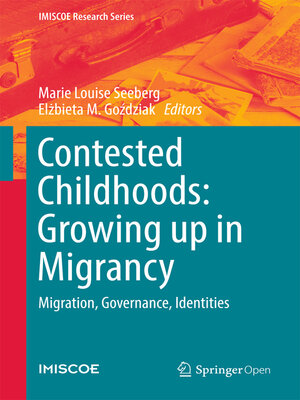Contested Childhoods
ebook ∣ Growing up in Migrancy: Migration, Governance, Identities · IMISCOE Research Series
By Marie Louise Seeberg

Sign up to save your library
With an OverDrive account, you can save your favorite libraries for at-a-glance information about availability. Find out more about OverDrive accounts.
Find this title in Libby, the library reading app by OverDrive.



Search for a digital library with this title
Title found at these libraries:
| Library Name | Distance |
|---|---|
| Loading... |
This book is open access under a CC BY-NC 2.5 license.
This open access book explores specific migration, governance, and identity processes currently involving children and ideas of childhood. Migrancy as a social space allows majority populations to question the capabilities of migrants, and is a space in which an increasing number of children are growing up. In this space, families, nation-states, civil society, as well as children themselves are central actors engaged in contesting the meaning of childhood. Childhood is a field of conceptual, moral and political contestation, where the 'battles' may range from minor tensions and everyday negotiations of symbolic or practical importance involving a limited number of people, to open conflicts involving violence and law enforcement. The chapters demonstrate the importance of how we understand phenomena involving children: when children are trafficked, seeking refuge, taken into custody, active in gangs or in youth organisations, and struggling with identity work. This book examines countries representing very different engagements and policies regarding migrancy and children. As a result, readers are presented with a comprehensive volume ideal for both the classroom and for policy-makers and practitioners. The chapters are written by experts in social anthropology, human geography, political science, sociology, and psychology.
This open access book explores specific migration, governance, and identity processes currently involving children and ideas of childhood. Migrancy as a social space allows majority populations to question the capabilities of migrants, and is a space in which an increasing number of children are growing up. In this space, families, nation-states, civil society, as well as children themselves are central actors engaged in contesting the meaning of childhood. Childhood is a field of conceptual, moral and political contestation, where the 'battles' may range from minor tensions and everyday negotiations of symbolic or practical importance involving a limited number of people, to open conflicts involving violence and law enforcement. The chapters demonstrate the importance of how we understand phenomena involving children: when children are trafficked, seeking refuge, taken into custody, active in gangs or in youth organisations, and struggling with identity work. This book examines countries representing very different engagements and policies regarding migrancy and children. As a result, readers are presented with a comprehensive volume ideal for both the classroom and for policy-makers and practitioners. The chapters are written by experts in social anthropology, human geography, political science, sociology, and psychology.







